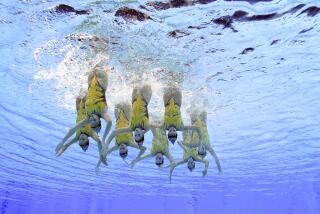His book on Chesapeake Bay won a Pulitzer
- Share via
WASHINGTON — William W. Warner, a retired Foreign Service officer whose first book, “Beautiful Swimmers: Watermen, Crabs and the Chesapeake Bay,” was a national bestseller and winner of the 1977 Pulitzer Prize for nonfiction, died April 18 of complications of Alzheimer’s disease at his home in Washington, D.C. He was 88.
Warner was nearing 60 when he published “Beautiful Swimmers” in 1976. The book is an elegantly written, scientifically accurate exploration of the Chesapeake Bay blue crab and the lives and lore of eastern shore watermen, who for more than three centuries have depended on Callinectes sapidus (Greek and Latin for “savory beautiful swimmer”).
Reviewing “Beautiful Swimmers” in the Washington Post, Larry McMurtry noted the book’s “high particularity” -- a particular animal, a particular place, a particular way of life. “The prose of ‘Beautiful Swimmers,’ ” McMurtry wrote, “has grace, wit and clarity, on top of a real strength of feeling; were one not inclined to read the book to find out about crabs and watermen, one would still read it merely for its sentences.”
Praise for Warner and his work also came from Morris Marsh, a Smith Island waterman profiled in “Beautiful Swimmers.” “I enjoyed him, really, and he mostly asked sensible questions,” Marsh told Tom Horton, who wrote an article for Washingtonian magazine in June 2007. “A lot says they want to go with you, but come 4 a.m., they’re not there. But he was always there, waiting to go.”
William Whitesides Warner, known to his friends as “Willie,” was born to wealth in New York City on April 2, 1920 -- “in a house without great books, without a father, and, for some periods of the year, without a mother,” he wrote in the introduction to his fourth book, “Into the Porcupine Cave.” His parents divorced when he was an infant; years later, he hired a private detective to track down his father.
Warner’s daughter, Alexandra Nash, recalled that her father was raised by an irascible step-grandfather whose behavior was so extreme that the young Warner and his only brother, Shot, escaped as often as they could into the wilderness along the Jersey shore. That’s where he began his lifelong love affair with nature.
After graduating from high school, he briefly attended Cornell University. At a dinner party, his knowledge of history and anthropology so impressed Childs Frick, a Princeton University paleontologist who was the son of the steel magnate Henry Frick, that Frick called the Princeton admissions office the next day and Warner was immediately accepted as a student.
After graduating cum laude from Princeton in 1943, he served as an aerial photograph analyst with a Marine air group and aboard the aircraft carrier San Jacinto in the Pacific during World War II. After the war, he was owner and operator, with his brother, of a ski resort in Stowe, Vt., and also taught English at a local high school. He skied until age 80.
He joined the U.S. Information Agency in 1953 and served for the next nine years as a public affairs officer in Costa Rica, Guatemala and Chile.
After working for two years for the newly established Peace Corps as program coordinator for Latin America, he joined the Smithsonian Institution, where he was instrumental in starting Smithsonian Magazine, Smithsonian Associates and the annual Folk Life Festival on the Mall. He retired in 1978.
“I just had this vague feeling that I’d like to do a little writing,” he told the New York Times in 1983. He soon realized, as he told the Times, that the “benign and beautiful waters” of the Chesapeake were his natural setting and the watermen were his natural heroes. He wrote the book in a closet-sized hideaway in an Audubon Society building in Bethesda, Md.
“Beautiful Swimmers” has never been out of print.
“Once a subject caught my father’s attention, he pursued it in an unrelenting fashion,” Nash said. She recalled that for his second book, “Distant Water: The Fate of the North Atlantic Fisherman” (1983), he went out for weeks at a time on trawlers from England, Spain, Germany and Russia. He studied Russian for six months with a tutor so he could converse with the crew of a Russian trawler.
He also wrote “At Peace With All Their Neighbors” (1994), a history of the Catholic Church in Washington, and “Into the Porcupine Cave and Other Odysseys: Adventures of an Occasional Naturalist” (1999).
In addition to his daughter, of Washington, survivors include his wife of 57 years, Kathleen McMahon Warner of Washington; five other children, John B. Warner, Georgiana Kaempfer, Elizabeth Brown and Andrew Warner, all of Washington, and Alletta Drakoulias of Los Angeles; and nine grandchildren.
More to Read
Sign up for our Book Club newsletter
Get the latest news, events and more from the Los Angeles Times Book Club, and help us get L.A. reading and talking.
You may occasionally receive promotional content from the Los Angeles Times.










